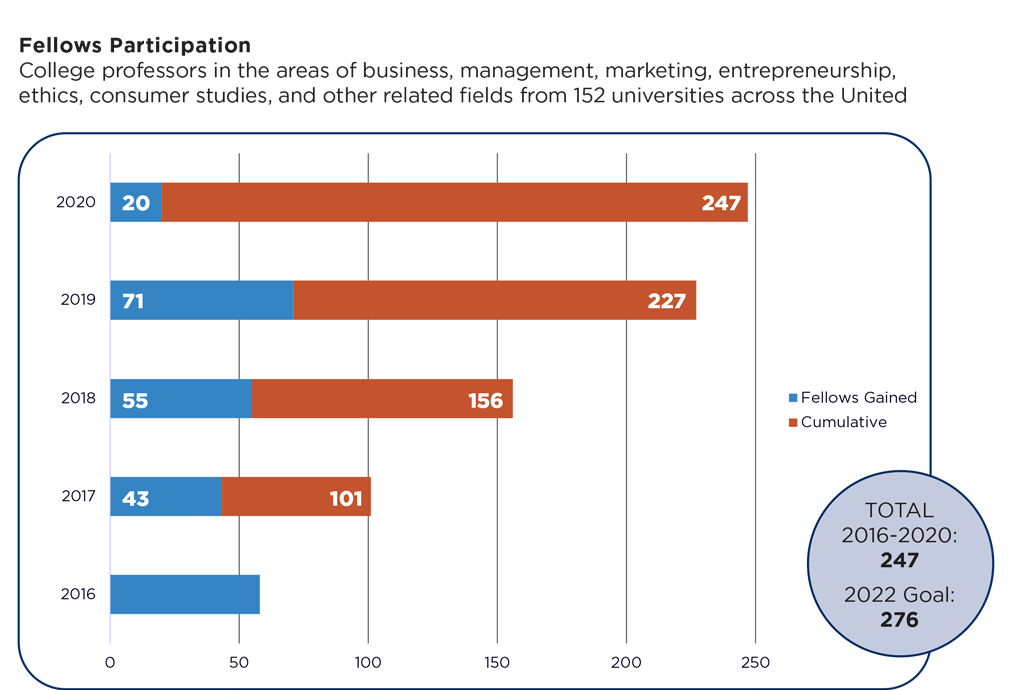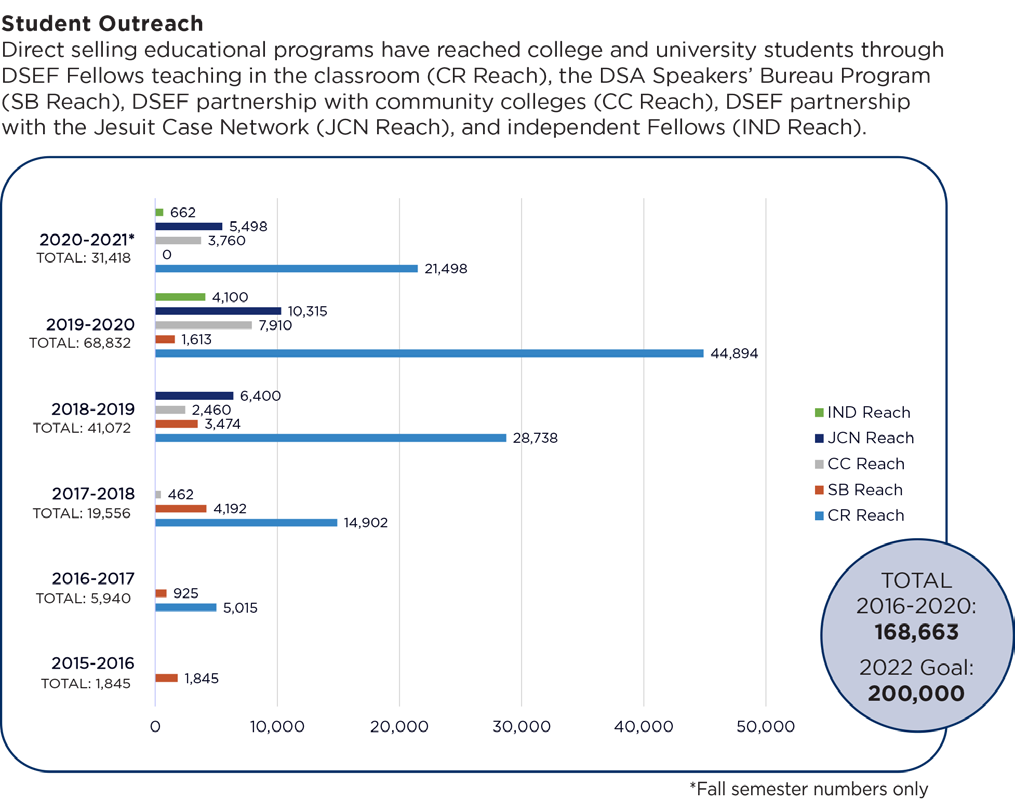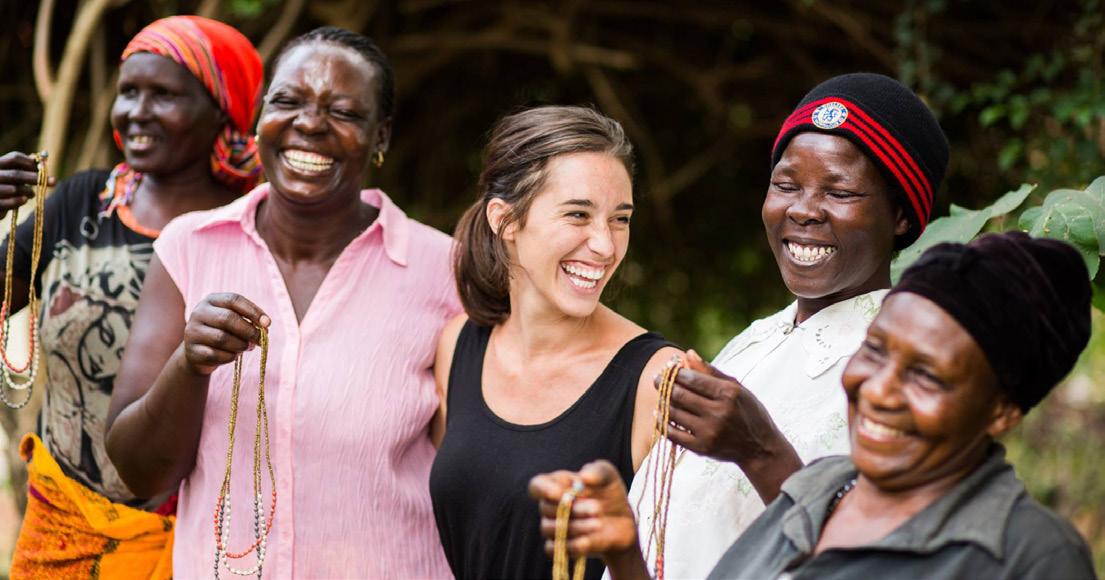How the Foundation’s Work Is Mainstreaming the Channel
Over the last four years, nearly 170,000 undergraduate and graduate students across the US have been introduced to the direct selling channel by university and community college faculty participating in the Direct Selling Education Foundation (DSEF) Fellows Program.
DSEF Fellows help to expand the knowledge and understanding of the direct selling business model by creating compelling classroom content focused on practices within the channel. Direct selling research has been published in notable peer-reviewed academic journals and is included in widely used Fellows-authored marketing, ethics, business, and entrepreneurship textbooks.
Case studies are just one of the ways Fellows teach students about direct selling. Developed with DSA member companies, case studies typically focus on issues faced by all businesses but are presented through the lens of direct selling. For the participating member company, a case study can have lasting effects: provide greater insight into the practices of the organization; instill a sense of pride in the salesforce; and promote positive brand awareness among academics, students, publishers, and key civic influencers.
Dr. Larry Chonko, the Thomas McMahon Professor in Business Ethics at the University of Texas at Arlington (UTA) College of Business, worked with DSEF for more than forty years until recently stepping away from commitments outside of his UTA role. Dr. Chonko used DSEF educational materials in his classes, hosted DSEF Campus Events, served as a panelist at DSA conferences, and was inducted into the Foundation’s Circle of Honor in 2004.
“DSEF’s cases, papers, teaching notes, and other pedagogical materials are always very informative about the industry and its companies,” said Dr. Chonko. “For the student, they provide excellent insight into the world of direct selling. They also provide students with opportunities to develop timeless skills like thinking introspectively, engaging in qualitative and quantitative analytics, and making decisions.”
Dr. Chonko is just one of the hundreds of professors in universities and community colleges across the United States who have benefitted from—and contributed to—a library of materials that serves to highlight and validate the contributions of direct selling companies and the channel.
As a DSEF Fellow, I’ve had the unique opportunity to network with leaders in the direct selling field and with excellent academic researchers."
—Caroline Glackin, Associate Professor of Entrepreneurship, Fayetteville State University
The DSEF Fellows Program—An Engine of Value Creation
DSEF partners with members of the academic community to support research and education programs that foster an accurate understanding of the channel as a powerful go-to-market strategy, distribution model, and entrepreneurial option.
Fellows are integral in expanding the reach of DSEF’s educational content, and thus, the accurate portrayals of the channel and its people. Their work is not only presented in universities and colleges here in the US but in institutions of higher education globally as well. In addition, through the Foundation’s partnership with the Global Jesuit Case Series (GJCS), which represents 189 Jesuit institutions throughout the world, DSEF case studies and related videos are available for download through GJCS’s online portal.
“As a DSEF Fellow, I’ve had the unique opportunity to network with leaders in the direct selling field and with excellent academic researchers,” said Caroline Glackin, Associate Professor of Entrepreneurship at Fayetteville State University. “I’ve written and published a teaching case about a direct selling executive, and have included multiple direct selling case studies in the fifth edition of a textbook on entrepreneurship. Finally, I was fortunate to have a direct selling executive visit my university and engage with our students.”
Since 2016, when the Fellows program launched, professors have co-created high-quality teaching content in conjunction with DSA member companies and executives and then incorporated it into their university and community college classrooms, including the areas of business, management, marketing, entrepreneurship, ethics, consumer studies, and other disciplines.
“The Foundation’s goal was to recruit 200 Fellows over the first three years,” said Nancy Laichas, Chief of Entrepreneurship Initiatives at DSEF. “We felt certain there was an opportunity to grow our partnership with the academic world and make the next generation aware of the economic impact of the channel, as well as the significant opportunities it provides as a path to market.”
The interest from professors exceeded expectations. As of December 2020, 247 academics from 152 colleges and universities have been named DSEF Fellows.
Plans for 2021
DSEF has a robust program of work planned for 2021, including producing eight new case studies, six academic research projects, and launching a variety of teaching content, including week-long direct selling modules developed in partnership with the University of North Carolina at Greensboro.
Additionally, in January 2021, the Foundation will continue its series of DSEF Insights webinars as part of DSA Engage that will feature academic partners sharing their expertise, data, and research through interactive discussions with direct selling company leaders and their teams.
“Increasing Fellows’ engagement and collaboration will deepen their knowledge of direct selling and lead to contributions that will achieve DSEF’s ultimate goal: mainstreaming the channel,” said Gary Huggins, Executive Director at DSEF. “The Foundation’s Fellows truly are its engine of value creation—bringing accurate, data-driven insights to the advancement of scholarship and teaching on the channel. As long as misinformation about the channel continues to persist, we need credible, third-party experts to uncover, analyze, and report the truth.”
Want to Participate in a DSEF Case Study?
Company case studies are important teaching tools that can also promote positive brand and channel awareness. To inquire about participating in a case study, contact Nancy Laichas, Chief of Entrepreneurship Initiatives, at nlaichas@dsef.org, or Kimberly Harris Bliton, Senior Director, Academic Initiatives, at khbliton@dsef.org.


Excerpt from DSEF Case Study
Social Entrepreneurship and the Direct Selling Channel: A Case Study on Trades of Hope
by Christine Mollenkopf-Pigsley, PhD, Minnesota State University, Mankato
Trades of Hope LLC is a Florida-based company founded in 2010 by entrepreneurs Chelsie Antos and Elisabeth Huijskens, and their mothers Gretchen Huijskens and Holly Wehde. These women didn’t set out to be the direct selling industry’s new generation of socially responsible leaders, they saw the struggles of women in their local community and globally and recognized a fundamental need to innovate how to effect social change. Founder Elisabeth Huijskens says “charity is for crises, but not for sustainability” when asked why they simply didn’t form a nonprofit organization, roll up their sleeves and get to work.
The Concept: Conscious Consumerism
The idea to sell jewelry, accessories, and other artisan-produced items from women in developing countries and sell them to American consumers was a natural fit with the four women’s interest in an emerging trend called conscious consumerism. This concept, described by Žabkar et al, is the consequences and the impact of their consumption on society, as well as their consideration for ethical issues when making a consumption decision.” The conscious consumer would support a higher price for the product than the mainstream competition as the business shared the stories of the women artisans with whom they partnered, and in turn, the business could pay the artisans up to six times what they were being paid through traditional wholesale channels in their countries.

The founders’ missionary organization connections provided the initial sourcing for the supply chain, and the connection to Three Angels and similar organizations connected them to women artisans and ethical cooperatives who were only selling in their own countries or unable to find an American outlet committed to fair trade. Utilizing the artisans from developing countries was a win-win opportunity because the artisans’ cost of “customers’ willingness to consider the long-term production was low. The fair trade pricing allowed the artisans to improve their economic conditions and make their products affordable to Trades of Hope, which could charge premium pricing for a specialty product and return a portion of the profit back into the social mission of the business, in addition to the benefit created for the artisans.
Growth & Reach
The founders were confident in their social entrepreneurship model, including a binary supply chain that connected women entrepreneurs and channeled the product to other women entrepreneurs, but the product remained the variable in the equation. They found a challenge in establishing a balance between money and the commitment of the makers to supply product that also honored the women artisans’ culture.
They also learned from the initial rollout of the product line that the American consumer not only connected with the stories of the makers and their struggles, but there was also a strong connection to the opportunity to change the personal economic situation of the individuals who would sell the products. Women possess a strong desire to help other women and children globally, however, their level of engagement would wane as financial strain increased. This dynamic between finances and altruistic behavior has been documented across the nonprofit sector as a psychological phenomenon, not a constraint of resources (Son & Wilson, 2015) which Trades of Hope saw as an opportunity to fundamentally change through social entrepreneurship. Empower the woman to feel a great sense of economic control and, in return, she will be psychologically motivated to engage more fully in the social mission of the company, sell more product, support more compassionate entrepreneurs, and ultimately increase her own economic stability in a sustainable loop of social value creation.
Social Value Creation
Trades of Hope views itself as a social enterprise and its mission and core values reflect this.
- We honor God and others.
- We value scrappy determination.
- We value each other’s differences.
- We strive to always get better.
- We value collaboration.
- We believe the best about people and the future.
- We celebrate people.
To quantify the social value created from the model, the company published a 2017 impact report. This report shows global reach including:
- People in full-time employment: 9,440
- People in part-time employment: 3,906
- People helped in artisans’ communities: 42,890
- People receiving health aid: 14,541
- Children being educated: 16,525
The company further calculated and promoted the multiplier impact from their salesforce as 7:1, meaning seven women are empowered by the work of a single compassionate entrepreneur. In addition to impact reporting, the company also periodically offers its employees and high performing compassionate entrepreneurs the opportunity to participate in vision trips where they travel internationally to meet the artisans, work with them to make the product, and see the impact of social entrepreneurship first hand in the schools, orphanages, and medical clinics. According to Chelsie, “on the vision trip, our compassionate entrepreneurs share with the artisans how the work they are doing is helping women in the US to thrive and that empowers the artisans as well.”
Trades of Hope artisans in developing countries are not just helping themselves, they are taking control of their families’ futures, keeping their families intact, educating their children, and becoming self-sufficient. The company frequently uses the phrase “women are the heroes of their own stories.” The Trades of Hope story and business model, which integrates social entrepreneurship, along with the direct selling channel, is an example worth examination and replication.
Want to learn more? Go to DSEF’s YouTube channel to view the video that Fellows use in the classroom to complement the Trades of Hope case study: youtu.be/AiQzLWqAwZc